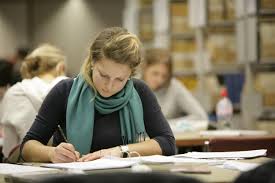study
英 [ˈstʌd.i]
美 [ˈstʌd.i]
- n. 学习,研究;课题;书房;学问
- vt. 学习;考虑;攻读;细察
- vi. 研究;用功
- n. (Study)人名;(英)斯塔迪
使用频率:

中文词源
study 学习,研究
来自拉丁语 studiare,学习,来自 studere,勤奋,勤勉,来自 PIE*steu,推,击,打,敲,词源 同 steep,type.引申诸相关词义。
英语词源
- study
-
study: [13] Study comes via Old French estudie from Latin studium ‘eagerness, intense application’, hence ‘application to learning’ (English studio [19] comes from the same ultimate source, only via Italian). Studium in turn was derived from the verb studēre ‘be eager, study’ (source of English student [15]). This probably went back ultimately to the Indo- European base *steud-, *teud- ‘hit’, which also produced Latin tundere ‘hit’ (source of English contusion and obtuse) and German stossen ‘shove, hit’ – the underlying notion of study thus being the ‘application of extreme effort’.
=> contusion, obtuse, student, studio - study (v.)
- early 12c., "to strive toward, devote oneself to, cultivate" (translating Latin occupatur), from Old French estudiier "to study, apply oneself, show zeal for; examine" (13c., Modern French étudier), from Medieval Latin studiare, from Latin studium "study, application," originally "eagerness," from studere "to be diligent" ("to be pressing forward"), from PIE *(s)teu- (1) "to push, stick, knock, beat" (see steep (adj.)).
Martha swanc and becarcade to geforðigene þan Hælende and his þeowen þa lichamlice behefðen. Seo studdede emb þa uterlice þing. [Homily for the Feast of the Virgin Mary, c.1125]
From c. 1300 as "apply oneself to the acquisition of learning, pursue a formal course of study," also "read a book or writings intently or meditatively." From mid-14c. as "reflect, muse, think, ponder." Meaning "regard attentively" is from 1660s. Related: Studied; studying. - study (n.)
- c. 1300, "application of the mind to the acquisition of knowledge, intensive reading and contemplation of a book, writings, etc.," from Old French estudie "care, attention, skill, thought; study, school" (Modern French étude), from Latin studium "study, application" (see study (v.)). Also from c. 1300 as "a state of deep thought or contemplation; a state of mental perplexity, doubt, anxiety; state of amazement or wonder." From mid-14c. as "careful examination, scrutiny." Sense of "room furnished with books" is from late 14c. Meaning "a subject of study" is from late 15c. Study hall is attested from 1891, originally a large common room in a college.
权威例句
- 1. Charles and I were closeted in his study for the briefing session.
- 我和查尔斯在他的书房里闭门开简介会。
- 2. The study links the main living area to the kitchen.
- 书房把主要的生活区与厨房连在一起。
- 3. 673 private golf clubs took part in a recent study.
- 673家私人高尔夫俱乐部参与了最近的研究。
- 4. He entered Otago University to study arts and divinity.
- 他进入奥特哥大学学习艺术和神学。
- 5. I invite every citizen to carefully study the document.
- 我请每位市民都仔细研读该文件。
